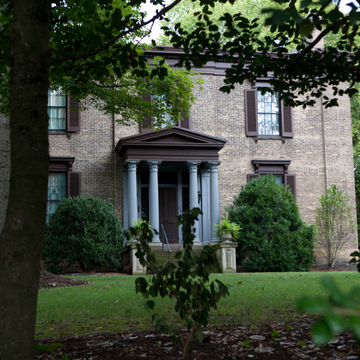Glenwood, the most impressive and best preserved of Charleston's remaining antebellum houses, was built as the seat of a large farm on the northwestern outskirts of town. Though the city has since grown around the house, an expansive yard retains much of the early landscaping and continues to afford privacy.
The two-story, conservative Greek Revival building conveys a certain somberness, due in part to the color scheme that has prevailed since the early 1900s. Brick walls and wood trim are painted brown, correlating with the sturdy ashlar sandstone foundations and portico. A finely detailed, one-story Corinthian portico with stone columns fronts the slightly projecting central bay of the three-bay facade. An extended slope of the main roof covers a two-story porch at the rear of the house. Interior trim is heavy and plain, though door and window frames are trabeated. A two-story brick slave quarters and kitchen remains in the rear yard.
William Preston, an English mason, built Glenwood for James Madison Laidley. Five years later, Laidley sold the property to George W. Summers (1804–1868), a member of the Virginia legislature and the U.S. House of Representatives as well as a judge on the Eighteenth Circuit Court. Summers is remembered for his eloquent opposition to Virginia's secession from the Union in 1861. Summers County, formed in 1871, was named to honor his memory. Much original Summers family furniture survives, as do family portraits by George Caleb Bingham. In 1978 the last Summers heir deeded Glenwood to the West Virginia College of Graduate Studies Foundation. In the 1980s Paul D. Marshall restored the house and slave quarters. Glenwood is open by appointment.




